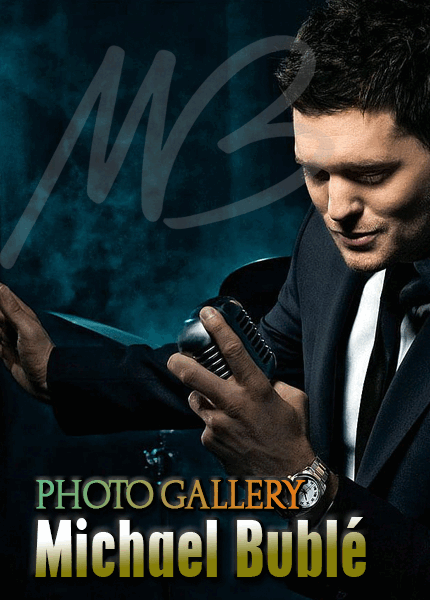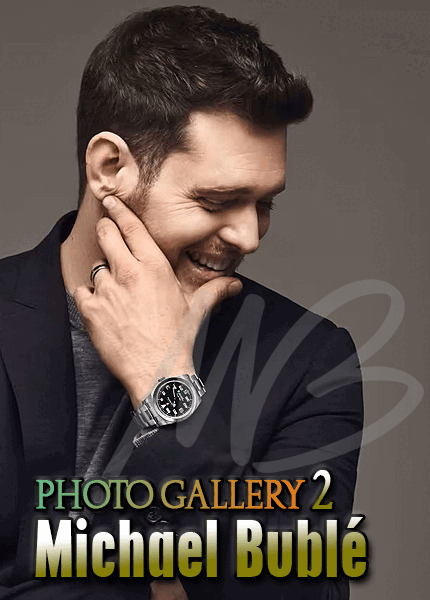
 |
|
MICHAEL BUBLĒ ON WHY HIS 10-YEAR STRUGGLE WAS "THE BEST THING THAT EVER HAPPENED TO ME" Source: by Taylor Weatherby (GRAMMYs / Oct 8, 2024)
The last week of September may have been Michael Bublé's most special of the year. Four days after making his debut as a coach on THE VOICE on Sept 23, he released his first-ever greatest hits album, THE BEST OF BUBLÉ.
It was a fitting
combination of two major career moments for the five-time
GRAMMY winner. While his BEST OF compilation honors his
catalog, his new role on THE VOICE allows him to personally
thank fans for a remarkable career. "To this day, I still can't believe I'm doing this," Bublé tells GRAMMY.com. "When I'm on THE VOICE, every chance I get, I'm jumping into the audience, because I'm emotional and sentimental about [how] each one of those people changed my life."
From hit originals
like 'Everything' to his reimagined Great American
Songbook classics such as 'Feeling Good' - and even
his treasured rendition of 'The Spider-Man Theme'
- THE
BEST OF
BUBLÉ celebrates
his impact as a contemporary crooner. Though that
legacy includes 75 million albums sold worldwide and
multiple No. 1 albums, Bublé is the first to admit that it
wasn't easy to convince industry players that his
traditional pop style would work in the 21st century.
Not only has he proven that tenfold, but through it all,
he's been able to stay true to who he is - and that's what
matters most.
I had [released] music for 10 years before my first [major label] record, which was [2003's] Michael Bublé. I had put out many independent records, I had gone and done a lot of indie festivals. I was singing this stuff forever - I mean, it seemed like forever, but I was 17 years old when my first independent record came out.
I was so stoic
about who I was, and the music that I loved. And I
loved jazz, and I loved the Great American Songbook. I
was so entrenched in loving that, and so protective of it.
But it's funny, because it was literally so far from being
cool or marketable that it took me so long to even get a
meeting with a record company.
Finally, when I
was 25, I was introduced to David Foster, who at that time,
was running 143/Reprise [Records] at Warner. He had
just had success with Josh Groban, and I think it had given
him a little bit of an opportunity. So I said to him,
"Would you take me to see Tom Whalley at Warner?"
And he said, "No way. You're on my radar, but I
just don't see how this kind of music is going to take off"
- the same thing!
I
I
I
A
Really, truly, the best thing that ever happened to me was not making it for so long. I was 27 the first time I ever felt like I had real success, and I had become who I was going to be as a man. I was so appreciative. To this day, I still can't believe I'm doing this. When I'm on THE VOICE, every chance I get, I'm jumping into the audience, because I'm emotional and sentimental about [how] each one of those people changed life.
[With 'Home'], I had a letter from an executive at the company, and it said, "You have said the word 'home' 41 times in this song. It's not a great song, and we don't want it." And then when I did 'Everything,' I was doing the music video for it, and I remember standing behind the trailer getting ready to go and shoot. And an executive said to me, "If I had known that you wanted originals, we would have hired a songwriter for you. I think the song is weak." On the first record that I did with David Foster, I had songs, and he used to say, "Well, you can do that on your solo record." There was this running joke, "Oh, you're a songwriter?" So those songs meant a lot to me. And then there's songs like, 'Feeling Good,' 'Cry Me A River.' I think the thing I'm best at is arranging and reinterpreting standards. But that comes with coming up with conceptual ideas that take a song and change it from the first time that you've heard it. For me, they were always very cinematic - even 'Feeling Good.' I mean, obviously, Nina Simone is a goddess. I was deeply infatuated by her and all her records. I had this very James Bond-esque thing that I had in my head. And I was so lucky that I could articulate that, and that a producer like David Foster could put that down on pen and paper. It was always cinematic. 'Quando, Quando, Quando,' I remember singing it to [David] and pretending that I could speak Portuguese. There's these demos where I'm singing the Nelly Furtado part. As ridiculous as it sounded, David got it. God, I love the Dap Kings. I miss Sharon Jones every day. 'Baby, You Got What It Takes' was one of my favorite songs ever. I got wasted with her when we did that recording. There was so much smoke in the booth, we couldn't see past each other. We performed on 'SNL' (Saturday Night Live) together, and we were like kids in a candy store. We couldn't believe we were doing it together. She was such a great lady, and the Dap Kings were such a badass group of musicians. There's so many memories, craziness. It's 21 years [of] making music with my favorite humans - my musicians, my co-writers, the arrangers, the producers. People I idolized. I was listening to [THE BEST OF BUBLÉ], and I was thinking about [the fact that] every note that came out of my mouth, I never let one go without it meaning everything. And whether I failed or succeeded, I can look back with this great sense of pride. |


.jpg)